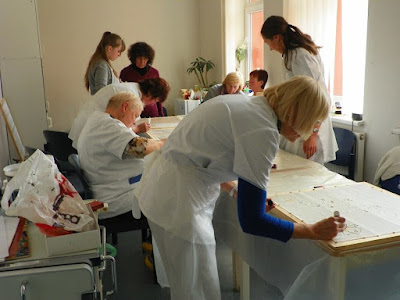Limited places available HERE for our free networking event in Manchester with colleagues from Arts Development Centre Finland on Tuesday 17th May.
I get so fed up with new research only being available if you subscribe to the gated community of self-selecting research journals, so it’s always good to see important work published in peer reviewed open access journals that are freely available to a wider community of interest. The International Journal of Environmental Research and Public Health have published the work of Simona Karpavičiūtė and Jūratė Macijauskienė which investigates the Impact of Arts Activity on Nursing Staff Well-Being: An Intervention in the Workplace. This work is not only important in herms of nursing staff, but has implications across the workforce as a whole in health and social care environments. Want to know more?
‘Over 59 million workers are employed in the healthcare sector globally, with a daily risk of being exposed to a complex variety of health and safety hazards. The purpose of this study was to investigate the impact of arts activity on the well-being of nursing staff. During October–December 2014, 115 nursing staff working in a hospital, took part in this study, which lasted for 10 weeks. The intervention group (n = 56) took part in silk painting activities once a week. Data was collected using socio-demographic questions, the Warwick-Edinburgh Mental Well-Being Scale, Short Form—36 Health Survey questionnaire, Reeder stress scale, and Multidimensional fatigue inventory (before and after art activities in both groups). Statistical data analysis included descriptive statistics (frequency, percentage, mean, standard deviation), non-parametric statistics analysis (Man Whitney U Test; Wilcoxon signed—ranks test), Fisher’s exact test and reliability analysis (Cronbach’s Alpha). The level of significance was set at p ≤ 0.05. In the intervention group, there was a tendency for participation in arts activity having a positive impact on their general health and mental well-being, reducing stress and fatigue, awaking creativity and increasing a sense of community at work. The control group did not show any improvements. Of the intervention group 93% reported enjoyment, with 75% aspiring to continue arts activity in the future. This research suggests that arts activity, as a workplace intervention, can be used to promote nursing staff well-being at work.’
To read the research in full, click on the image below.
The Ragdoll Foundation is dedicated to supporting the creation, appreciation and awareness of imaginative and innovative content that reflects the world from a child’s point of view. The Ragdoll Foundation’s Open Grant scheme has been designed to support the cultural sector’s work with children and young people. Its vision is to support projects where the concerns of childhood can be heard. All applications are expected to contribute to the Ragdoll Foundation’s primary purpose. The Open Grant Scheme is open for application.
Preference will be given to innovative projects that share the same values of imagination and creativity as the Ragdoll Foundation. In particular, those projects which have a deep commitment to listening to children and allow the perceptions and feelings of children themselves to be better understood. It is mainly interested in applications that involve children during their early years, but appropriate projects for older children (up to 18 years) will also be considered.
The Ragdoll Foundation welcomes applications of up to £50,000, though the majority of grants made are likely to be in the region of £5,000 to £30,000. Applications will be considered for both one-off short-term projects and for projects lasting up to three years. The Ragdoll Foundation accepts applications from not-for-profit organisations based in the UK. It will only fund work that is legally charitable. For full details and eligibility criteria, click on the image below.
The Shared Ground Fund will support organisations to provide direct services and support to young people, and/or work that seeks to influence relevant policy or practice. It will provide organisations with the financial support they need to test new approaches and explore ways of addressing new challenges in this area of great change and uncertainty.
Applicants must contribute to one or both aims:
Living well together – supporting work for the benefit of young people which helps communities experiencing high levels of migration become stronger and more connected
Staying safe – ensuring that young migrants in greatest need can get help and support
The ‘explore and test’ grants are open to applications now and are accepted on a rolling basis. Read more HERE.































No comments:
Post a Comment